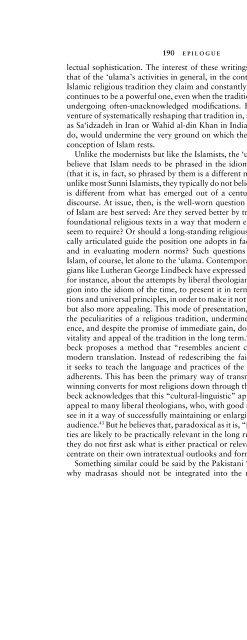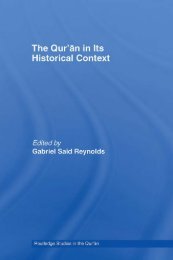Download (1 MB) - Islam and Christian-Muslim Relations: Articles ...
Download (1 MB) - Islam and Christian-Muslim Relations: Articles ...
Download (1 MB) - Islam and Christian-Muslim Relations: Articles ...
Create successful ePaper yourself
Turn your PDF publications into a flip-book with our unique Google optimized e-Paper software.
190 EPILOGUElectual sophistication. The interest of these writings lies rather, as doesthat of the ‘ulama’s activities in general, in the continuing link with the<strong>Islam</strong>ic religious tradition they claim <strong>and</strong> constantly reaffirm. This claimcontinues to be a powerful one, even when the tradition itself is constantlyundergoing often-unacknowledged modifications. But to embark on aventure of systematically reshaping that tradition in, say, the realm of law,as Sa‘idzadeh in Iran or Wahid al-din Khan in India urges the ‘ulama todo, would undermine the very ground on which their position <strong>and</strong> theirconception of <strong>Islam</strong> rests.Unlike the modernists but like the <strong>Islam</strong>ists, the ‘ulama do not usuallybelieve that <strong>Islam</strong> needs to be phrased in the idiom of the modern age(that it is, in fact, so phrased by them is a different matter, however). Yetunlike most Sunni <strong>Islam</strong>ists, they typically do not believe that “true” <strong>Islam</strong>is different from what has emerged out of a centuries-old tradition ofdiscourse. At issue, then, is the well-worn question of how the interestsof <strong>Islam</strong> are best served: Are they served better by trying to interpret thefoundational religious texts in a way that modern exigencies <strong>and</strong> valuesseem to require? Or should a long-st<strong>and</strong>ing religious tradition as historicallyarticulated guide the position one adopts in facing these exigencies<strong>and</strong> in evaluating modern norms? Such questions are not peculiar to<strong>Islam</strong>, of course, let alone to the ‘ulama. Contemporary <strong>Christian</strong> theologianslike Lutheran George Lindbeck have expressed serious reservations,for instance, about the attempts by liberal theologians to “translate” religioninto the idiom of the time, to present it in terms of shared foundations<strong>and</strong> universal principles, in order to make it not just more intelligiblebut also more appealing. This mode of presentation, he believes, distortsthe peculiarities of a religious tradition, undermines its internal coherence,<strong>and</strong> despite the promise of immediate gain, does a disservice to thevitality <strong>and</strong> appeal of the tradition in the long term. 41 For his part, Lindbeckproposes a method that “resembles ancient catechesis more thanmodern translation. Instead of redescribing the faith in new concepts,it seeks to teach the language <strong>and</strong> practices of the religion to potentialadherents. This has been the primary way of transmitting the faith <strong>and</strong>winning converts for most religions down through the centuries.” 42 Lindbeckacknowledges that this “cultural-linguistic” approach is unlikely toappeal to many liberal theologians, who, with good reason, would fail tosee in it a way of successfully maintaining or enlarging the ranks of theiraudience. 43 But he believes that, paradoxical as it is, “[r]eligious communitiesare likely to be practically relevant in the long run to the degree thatthey do not first ask what is either practical or relevant, but instead concentrateon their own intratextual outlooks <strong>and</strong> forms of life.” 44Something similar could be said by the Pakistani ‘ulama in explainingwhy madrasas should not be integrated into the nation’s educational



